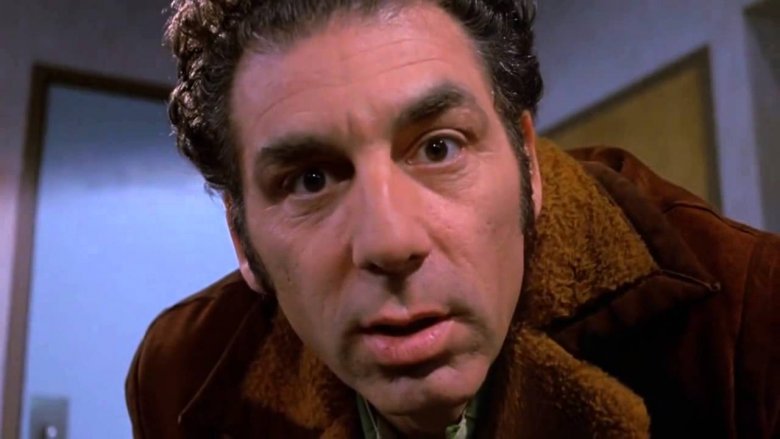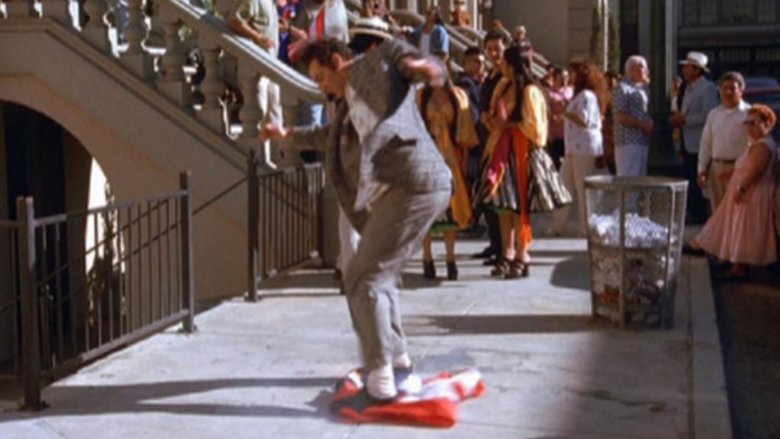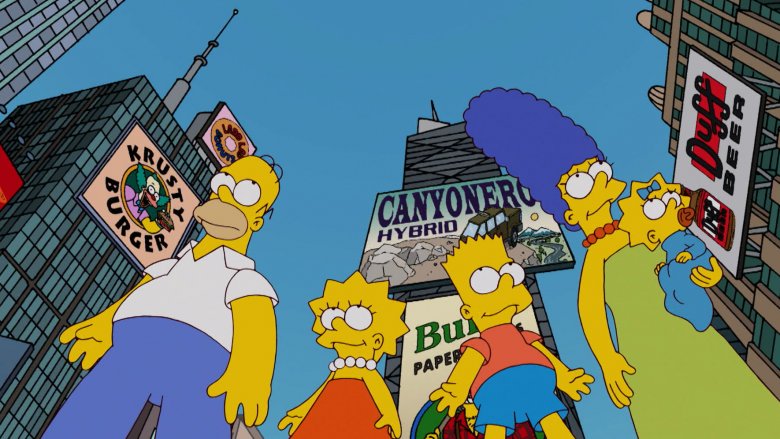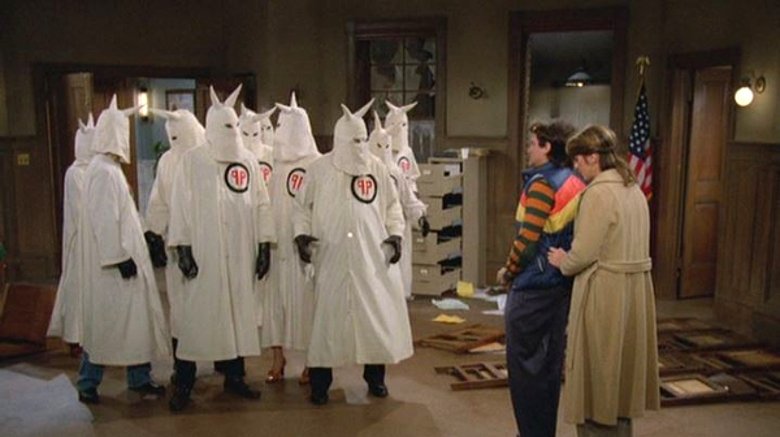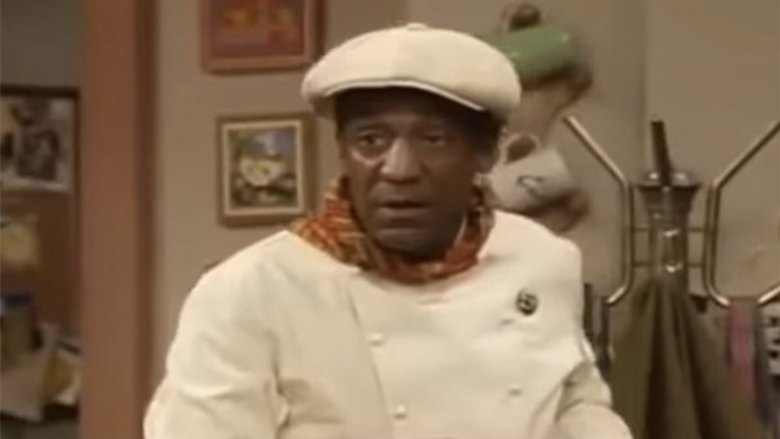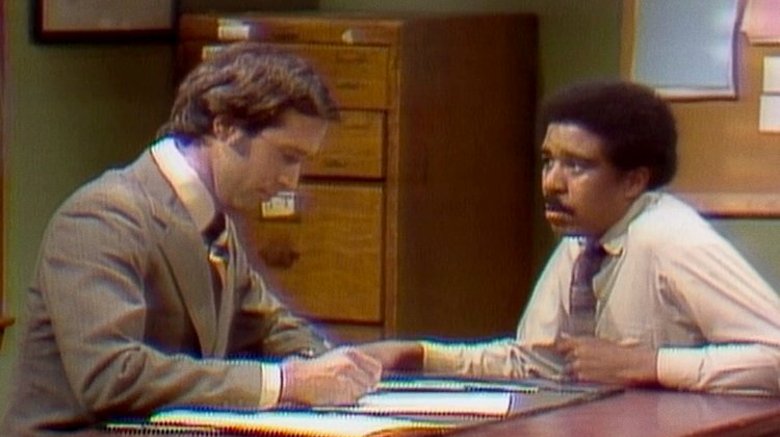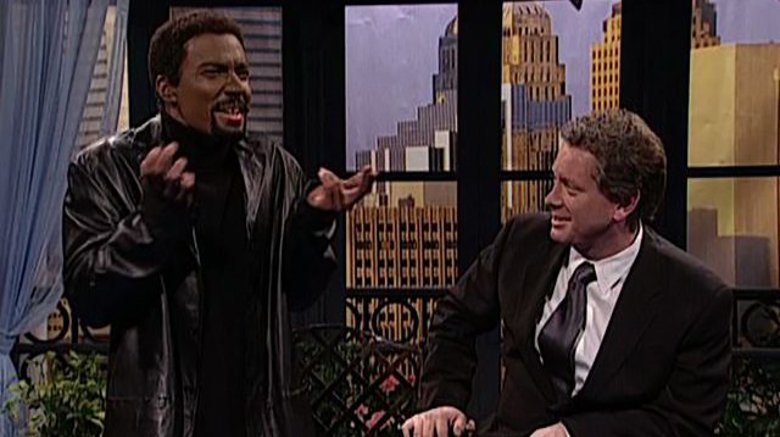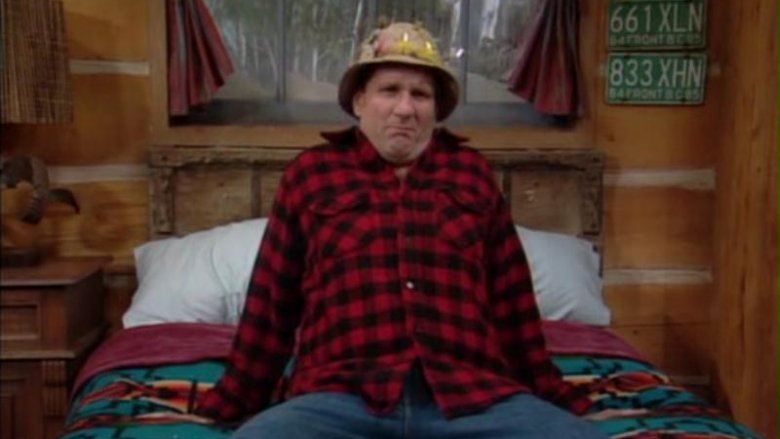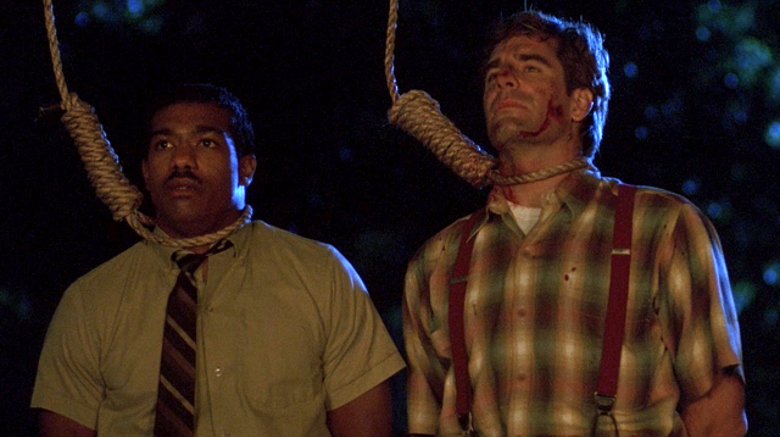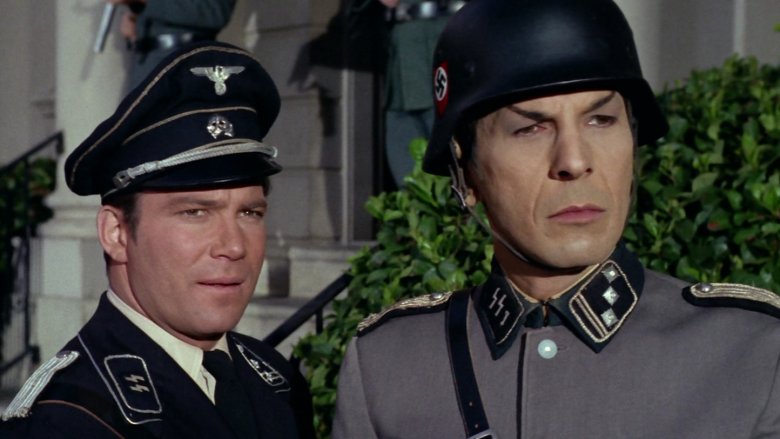TV Scenes That Would Not Be OK To Film Today
Just because a scene makes it onto TV, that doesn't mean it's any good. Television history is littered with bad, insulting or just plain forgettable scripts — and as writers have looked to push the boundaries of good taste in the name of entertainment, they've broached many taboo subjects. Racism, misogyny, and sexual orientation are just some of the many topics that dramas and comedies have both tried to integrate into their plots. While some stories have successfully navigated the delicate balance of controversy and social consciousness, others have fallen flat.
In some instances, misguided attempts to educate the audience actually did more harm than good. In other cases, poor humor was at fault. And then there are all the times when cultural shifts have rendered the moments unpalatable for a modern audience. Whatever the reason, here's a look all all the reasons these previously aired scenes would never be okay to film for TV today.
Seinfeld fires up Puerto Ricans
In the episode "Puerto Rican Day," the Seinfeld crew is stuck in traffic due to New York's annual Puerto Rican Day Parade. Jerry, George, Elaine and Kramer each set out on foot, searching for a path home through the mayhem. At one point, Kramer (Michael Richards) accidentally lights the Puerto Rican flag on fire, only to throw it to the ground and stomp it out.
The scene caused controversy after the episode's original airing in 1998, sparking protests outside of NBC's Rockefeller Center headquarters. The president of the National Puerto Rican Coalition called the scene an "unconscionable insult.” NBC issued a statement on the controversy saying "We do not feel that the show lends itself to damaging ethnic stereotypes, because the audience for Seinfeld knows the humor is derived from watching the core group of characters get themselves into difficult situations." NBC president Robert Wright added, ”Our appreciation of the broad comedy of Seinfeld does not in any way take away from the respect we have for the Puerto Rican flag.”
These days, it's doubtful the flag-burning scene would have ever made it to air, especially when you factor in actor Michael Richards' own controversy surrounding racially insensitive remarks.
The Simpsons visit the World Trade Towers
In the Simpsons episode "The City of New York vs. Homer Simpson," Homer's car is illegally parked at the World Trade Center and he has to travel to New York to retrieve it. The World Trade Towers serve as a key location in the episode as everyone's favorite cartoon dad struggles to get his vehicle back to Springfield.
The episode originally aired in 1997, four years before the September 11th attacks that destroyed the towers. Obviously, The Simpsons' writers had no idea that such a horrific terrorist attack would take place in the location in which they based their scenes. Still, jabs at the city of New York and a comment that "They stick all the jerks in tower one" would not be well received in a post-9/11 TV landscape. (Bart's line later in the episode, "Hey immigrants, beat it! Country's full!" probably wouldn't sit well with viewers in today's climate either.)
"The City of New York vs. Homer Simpson" would be pulled from syndication following the terrorist attacks, but has returned to the air in recent years.
Mork and Mindy encounter a hate group
In a Mork & Mindy episode titled "The Night They Raided Mind-ski's," Mork, the good-hearted alien played by Robin Williams, unknowingly befriends a hate group similar to the Klu Klux Klan. At its heart, this episode tried to show the evils of bigotry; however, the dialogue would never fly on television today. In one scene, the racists sit around a coffee table spewing harsh and offensive ethnic slurs, including "spic," "jungle baby," and "kraut" (and those are the just the ones we're comfortable repeating).
Another cringeworthy moment comes at the end of the episode, when Mork tries to teach the hate group a lesson by changing their DNA. This causes the racists' white skin color to change — not exactly the most culturally sensitive TV moment. It's hard to watch now, but it's also easy to understand why: so much racial tension is hard to handle in one 30-minute episode, especially considering the show was a comedy.
The Cosby Show gets downright creepy
Plenty of Cosby Show moments have taken on new meaning since the terrible revelations about star and creator Bill Cosby have come to light. Still, none are more uncomfortable than "The Last Barbecue," an episode whose plot revolves around a special sauce that Cosby uses to get people "in the mood."
The premise of the episode seems basic enough. Theo, the son of Cosby's Cliff Huxtable character, is planning to hire a stripper for his brother-in-law-to-be's bachelor party. When the women in the family find out about the plan, the couples begin to argue. The creepiness arrives when Cliff serves up his barbecue sauce, a secret recipe that makes people who eat it amorous. At the close of the episode, he uses the same magic sauce to get his own wife into bed.
The real-life Cosby was accused of sex offenses by more than 60 women. The actor even admitted to obtaining quaaludes to give to women that he hoped to have sex with. He was convicted in 2018.
Saturday Night Live gives the n-word a spotlight
Several well-known Saturday Night Live sketches would be seen as racially insensitive today; arguably the most famous example is the "word association" sketch with Chevy Chase and Richard Pryor. Pryor is applying for a job when Chase, the hiring manager, conducts what he claims to be a simple word association test.
Things start innocuously enough, as Chase offers up words like "dog" and "rain." But the mood changes when racially charged terms like "negro" and "tar baby" are thrown into the conversation. The tension escalates as the comedy legends trade barbs — Chase delivering racial slurs against African-Americans, Pryor returning fire with derogatory terms for white people. The skit has become legendary as well as infamous: Some critics panned its use of the N-word, while others praised the brave move to put racial tensions under the comedic spotlight.
The scene's writer, Paul Mooney, would later liken the sketch to an "H-bomb." "All that (stuff) going on behind closed doors is now out in the open. There's no putting the genie back in the bottle. The N-word as a weapon, turned back against those who use it, has been born on national TV." Despite the skit's cultural significance, there's no way its language and subject matter would get past censors today.
Saturday Night Live lets Jimmy Fallon wear blackface
This Saturday Night Live sketch focused on daytime talk legend Regis Philbin (played by Daryl Hammond), auditioning possible replacements for his cohost. A parade of celebrities, played by the SNL cast, come to the stage as possible options. There's Tracy Morgan as Starr Jones, then Rachel Dratch as Janeane Garofalo. So far, so good — and then Jimmy Fallon appears in blackface impersonating Chris Rock. In character, Fallon jokes about Philbin's turn hosting Who Wants to Be a Millionaire, claiming, "Black folks don't like to answer questions. They want to be millionaires, but you gotta ask their kind of questions. Like 'In 1981, how many grams of crack did Rick James smoke when he recorded 'Super Freak'?'"
The sketch originally aired in 2000, much more recently than similarly politically incorrect entries in this list. It's doubtful that any network executive would allow a white comedian to don blackface on TV today. Allowing the comedian to then spout jokes based around racial stereotypes would only make the matter worse. It should be noted that in NBC's online SNL archive, the sketch has been re-edited with Fallon's appearance completely wiped from the scene.
Married with Children, period
Married... With Children frequently attracted controversy during its long run, often called out for its fat-shaming, sexist humor, and jokes about spousal abuse. Still, the show's misogyny was arguably at its peak in an episode called "The Camping Show."
Originally aired in 1988, the episode sees Al Bundy and his masculine pals heading to the great outdoors. When his wife, Peggy, neighbor Marcy and daughter Kelly all tag along, the men become annoyed. When the women all happen to be menstruating at the same time, the men decide they'd rather face wild animals than deal with ladies on their periods. A scene when Al claims women invented periods to ruin men's lives sounds incredibly ignorant today: "You know why they're doing this to us. It's because we were gonna have fun. That's why they invented this period thing. Back before man, women didn't have periods. Gee, it would have been nice to have lived then."
The episode was initially postponed from airing by FOX executives concerned that female viewers would feel insulted. Eventually, they relented and "The Camping Show" aired on Dec. 11, 1988. Surprisingly, the episode was written by two women.
Cow & Chicken & sexual stereotypes
Cartoon Network's animated comedy Cow and Chicken followed the misadventures of the title characters — different species who somehow happened to be siblings. Produced by Hanna-Barbera and airing for three seasons, the cartoon connected with its youth audience despite jokes that were definitely geared toward adults.
In a 1998 episode titled "Buffalo Gals," a female biker gang break into Cow and Chicken's home and vandalize the place. The "gals" reflected many negative stereotypes associated with lesbians — they played softball, they literally ate carpet, and one of the characters even had the name Munch Kelly. Sexual innuendos are continually strewn throughout the episode, though most would have (hopefully) gone over the heads of younger viewers.
"Buffalo Gals" was quickly identified by network execs as a lightning rod for controversy, but in today's world, the LGBTQ community has gained a strong and still-growing voice, and reinforcement of such antiquated negative stereotypes would not be tolerated.
Quantum Leap Joins the KKK
Quantum Leap starred Scott Bakula as Dr. Sam Beckett, a scientist who travels through time, temporarily taking the place of other people to correct mistakes. The show developed a cult following in the late '80s and early '90s, helping the series last for five seasons.
While episodes covered many periods throughout history, one titled "Justice" crossed some serious lines. The plot revolved around Beckett leaping into the body of a Ku Klux Klan member, and subsequently rescuing a black civil rights activist from being lynched. From the beginning of the episode, things get uncomfortable, as Beckett has to "blend in" with other Klan members. In this moment, the audience is literally watching the show's hero embrace the KKK. It can easily be argued that the show comes across as sympathetic to the hate group. Making matters worse, the N-word is used 11 times throughout the 45-minute episode. Such a plot would never see the light of day on today's television.
Star Trek Discovers a Nazi Planet
Imagine a world in which the Nazis won World War II. Such a premise spawned Man in the High Castle, Amazon's critically acclaimed hit series. However, when the original Star Trek TV show tackled a similar story line decades ago, things went much more poorly.
In a season two episode, Captain Kirk and company discover a planet ruled by a Nazi-like regime. When they beam down to the unknown planet, the crew of the Enterprise witnesses military personnel marching in uniforms decorated with swastikas, soldiers greeting each other with the Nazi salute, and crowds shouting slogans that bear stark resemblance to the Axis powers'.
These components don't inherently make the episode cringeworthy — the biggest issue is that the storyline takes a fairly sympathetic view of the Hitler-like tyrant running the planet. In one scene the Nazis are even referred to as the "most efficient society" ever created. It wouldn't be until 2011, 43 years after its production, that the episode was broadcast in Germany.
